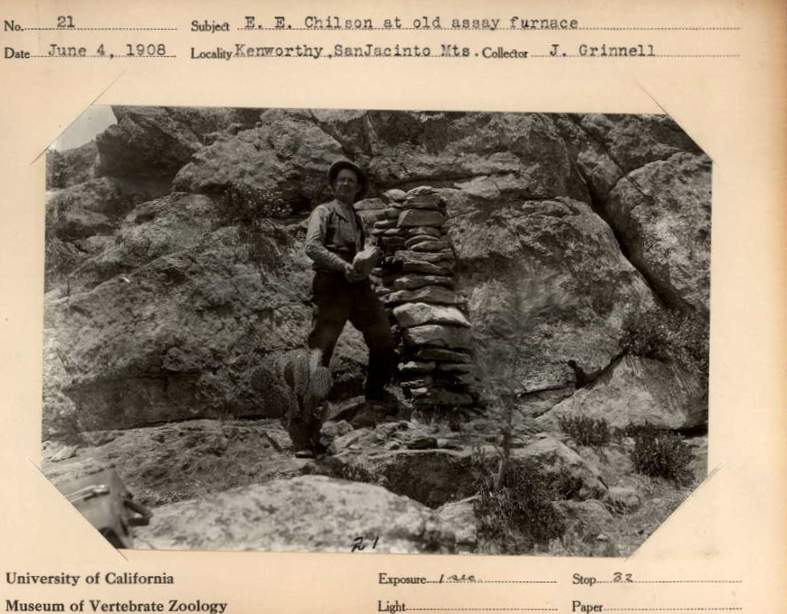The location notice for the “Silver Nugget” having not been recorded, as the nearest recorder’s office was at Florence, it was therefore not necessary to draw up any agreement of transfer. A new location notice was posted which gave Gip the full ownership of the mine. He also located two additional claims, which he named “The Rifleman” and “The Hoodoo”. He then returned to Florence.
At Florence he made the acquaintance of Mr. Stiles and Mr. McMorris, who was stopping with Stiles. Gip showed them some silver nuggets and agreed to locate for them a claim, if they would furnish him a pack mule, provisions and a small sum of money with which to buy another bill of provisions when needed. Stiles and McMorris supplied the much-needed necessities and Gip returned to the “Silver Nugget”.
He located the north end extension of the “Silver Nugget” for Stiles and McMorris, naming the claim the “Silver Spring”; there was a fine spring of water on the property, to say the least of an exceptionally fine silver showing.
It is obvious that Chilson’s intentions toward those who had helped him in his hour of need were of the very best, inasmuch as he located for them one of the finest and best showings he had discovered.
Stiles was very busy on his ranch, could not devote his time to the claim, so gave a Mr. Cook one-half of his interest in the property to represent him. Shortly after the transaction, Cook sold his one-fourth interest to Baldwin for $10,000 cash. Later, Stiles sold his one-fourth interest to Baldwin for $10,000; then about one year later, McMorris sold his one-half interest to Baldwin for $50,000.
Baldwin built a mill at the Wheat Fields, about 10 miles distant from the mine, to mill the “Silver Spring” ore. A great deal of ore was mined, shipped and milled from this property. This is the property which was known as “The McMorris Mine”.
When Gip arrived at Florence, in search of pack animal and provisions, he wrote to his brothers, Eme and Bill, who were in California, to come to him at once, which they did. Several weeks were required to make the trip, as the Indians were on a rampage throughout the country.

In the meantime, Gip had returned to the “Silver Nugget” and was gathering up all the nuggets he could find on the surface and burying them under his campfire until his brothers arrived. During the time, Gip ran pretty low on provisions. One evening about sundown Bob Dicky rode up to find Gip scratching around among some ironwood chips. Gip asked Dickey to stop over with him, stating that they would have something to eat as soon as he could find some old bacon rinds he had thrown among the chips, as he needed them to season the beans. Dickey told about the incident later, stating that little did he realize that Gip had over $10,000 in silver nuggets buried under the old black bean pot on that campfire.
The small basin in which the “Silver Nugget” mine was located was so rich that Gip Chilson then and there named it “Richman” basin. This basin was not named after anyone by the name of Richman, which seems to be the popular opinion. The Chilson brothers rarely named any discovery after themselves; they most always selected or coined a name due to some incident at the time of discovery, or a name in keeping with the local conditions. I know of one exception, in which George Chilson, a relative, blazed a 200-mile trail in Idaho, which bears the name. Bob Dicky and John Allvany located a claim adjoining the “Silver Spring” which they named after the basin calling it the “Richman”.
It is true that McMillan and Dory Harris discovered the “Stonewall Jackson”, “Hannibal”, “Ben. Lee”, and “Little Doctor”. McMillan and Harris shipped about $25,000 worth of ore and later sold to Mr. Martin of Santa Rosa, California. Mr. Martin was a minister.
All of the shipping ore from the “Silver Nugget” mine was packed to the “Silver King” mine, and from there it was hauled to Wilmington, California, and shipped by steamer to the Millrose Sampling Works at San Francisco.
The freight teams hauling supplies from California to the “Silver King” mine and other Arizona points would return to California light, excepting for a small amount of ore. The “Silver Nugget” ore was very rich and the tonnage was small. The teamsters were glad to have the return freight. The first shipment from the mine amounted to about fifteen hundred pounds of ore, which was hauled by Gip himself, after his brothers had arrived at the mine. That fifteen hundred pounds was worth over $10,000. The following shipments averaged about $4,000 per ton.